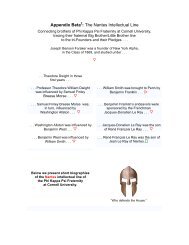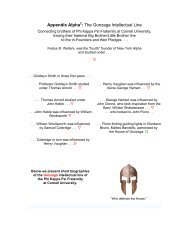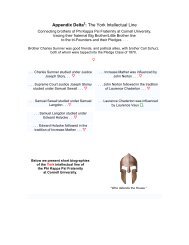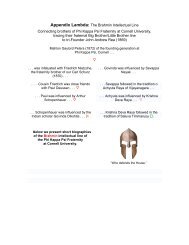Gondar - Phi Kappa Psi
Gondar - Phi Kappa Psi
Gondar - Phi Kappa Psi
Create successful ePaper yourself
Turn your PDF publications into a flip-book with our unique Google optimized e-Paper software.
Peter Canisus was sent forth by Ignatius Loyola, founder of the<br />
Society of Jesus – “the Jesuits” – who worked with<br />
his brothers, Francis Xavier and his<br />
conferes, to revive orthodoxy<br />
beyond the Suez:<br />
University of Paris in 1529,<br />
Pierre Favre, Francisco Xavier, and Iñigo<br />
de Loyola began sharing a room. They<br />
went on to change the world. Early 16thcentury<br />
Paris was a time of major changes.<br />
Influenced by the discovery of the<br />
Americas and an ongoing European<br />
Renaissance, the culture began<br />
embodying the new values of a modern<br />
world. Economies were shifting, and a time<br />
of scientific innovation was dawning.<br />
Stirred by the advent of the printing press,<br />
information spread with hitherto unmatched<br />
ease. Similar to how the Internet is<br />
influencing our times, mass-produced<br />
printed materials fueled a new level of<br />
literacy, as publications of the Bible,<br />
theological concepts, and philosophical<br />
musings blew a spirit of inquiry through the<br />
Church.<br />
University of Paris<br />
“the Sorbonne”<br />
Long before electricity had been discovered and harnessed, the urban<br />
landscape of The emblematic image of University of Paris today—an edifice<br />
constructed as part of a rebuilding of the university, launched the same year<br />
Loyola and Xavier were canonized.<br />
This was the city into which Iñigo Lopez de Oñaz y Loyola (Ignatius of<br />
Loyola) trekked, on fire with a desire to attend the University of Paris and expand<br />
his own intellectual and spiritual horizons. He was assigned to a room with two<br />
younger men—Pierre Favre (Peter Faber) and Francisco de Isaau de Xavier<br />
(Francis Xavier). The friendship of these three college roommates would<br />
profoundly affect the times in which they lived and all the centuries since.<br />
Historians usually search for deep causes of developments that reshape<br />
the world, but sometimes luck or chance play the major role. Such was the case<br />
in 1525 when fate, fortune, or maybe the mysterious working of divine providence<br />
assigned Pierre Favre and Francisco Xavier to the same room at the University<br />
of Paris, which they shared until 1536. A third roommate, Iñigo de Loyola, joined<br />
them for six years (1529-35) until returning to Spain.






